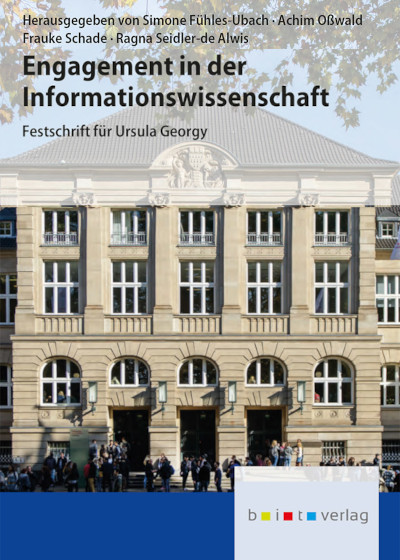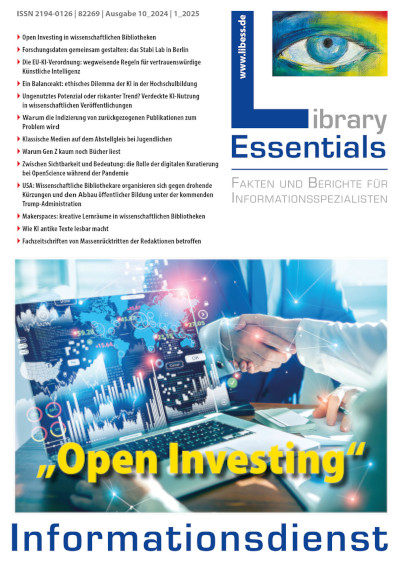 WEITERE NEWS
WEITERE NEWS
- Neuer CIO der Deutschen Nationalbibliothek: Wolfgang Stille übernimmt Verantwortung für Digitalisierung
- Börsenverein und Deutscher Bibliotheksverband prämieren frühkindliche Leseförderung: Bewerbungsstart für Gütesiegel Buchkita
- Bitkom fordert Digitalpakt Deutschland
- Bibliotheksverband begrüßt geplantes Sondervermögen des Bundes für Infrastrukturinvestitionen
- Willkommen an Bord: Pierre Bourdon wird Geschäftsführer der ekz-Gruppe
- KFiD legt Neumodellierung des Kerndatensatzes Forschung vor
- Digitale Langzeitarchivierung: nestor Community Survey 2023 veröffentlicht
- Premiere der Philippinen auf der Leipziger Buchmesse mit sieben philippinischen Autor:innen und deutschen Neuerscheinungen

Aktuelles aus
L
ibrary
Essentials
In der Ausgabe
- Open Investing in wissenschaftlichen Bibliotheken
- Forschungsdaten gemeinsam gestalten: das Stabi Lab in Berlin
- Die EU-KI-Verordnung: wegweisende Regeln für vertrauenswürdige Künstliche Intelligenz
- Ein Balanceakt: ethisches Dilemma der KI in der Hochschulbildung
- Ungenutztes Potenzial oder riskanter Trend? Verdeckte KI-Nutzung in wissenschaftlichen Veröffentlichungen
- Warum die Indizierung von zurückgezogenen Publikationen zum Problem wird
- Klassische Medien auf dem Abstellgleis bei Jugendlichen
- Warum Gen Z kaum noch Bücher liest
- Zwischen Sichtbarkeit und Bedeutung: die Rolle der digitalen Kuratierung bei OpenScience während der Pandemie
- USA: Wissenschaftliche Bibliothekare organisieren sich gegen drohende Kürzungen und den Abbau öffentlicher Bildung unter der kommenden Trump-Administration
- Makerspaces: kreative Lernräume in wissenschaftlichen Bibliotheken
- Wie KI antike Texte lesbar macht
- Fachzeitschriften von Massenrücktritten der Redaktionen betroffen

fachbuchjournal




















































